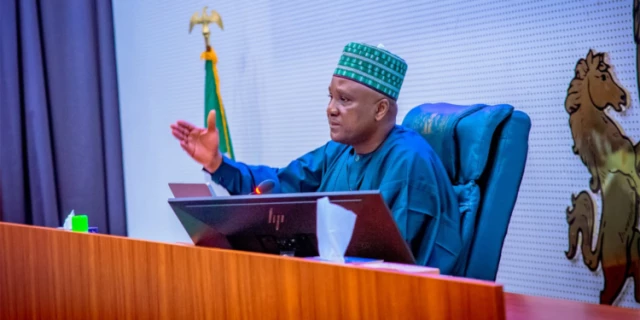The Speaker of the House of Representatives, Rt. Hon. Tajudeen Abbas, has attributed the worsening farmer-herder clashes in Nigeria to the effects of climate change, urging a shift away from outdated agricultural practices to mitigate the crisis.
Speaking at a stakeholders’ forum in Abuja on Wednesday, on climate change and farmer-herder conflicts, organised by the office of the Deputy Chairman of the House Committee on Environment, Abbas emphasised the need for Nigeria to adopt global trends in farming to counter the escalating conflict.
The event also premiered the documentary 'Behind the Valley,' which highlights the impact of climate change on farmer-herder conflicts in Benue State.
The Speaker, represented by Hon. Dickson Takighir, member representing Makurdi/Guma Federal Constituency of Benue State, noted the critical timing of the forum amidst ongoing efforts to address the crisis.
Abbas said, “Climate change has exacerbated the farmer-herder challenges, leading to increased competition for dwindling resources.
“Distortions in rainfall patterns have resulted in desertification, forcing herders to migrate into farming communities, often with violent consequences.”
He lamented that despite various efforts by the Federal and State governments, little progress had been made in resolving the conflict.
However, he praised President Bola Ahmed Tinubu’s recent establishment of the Ministry of Livestock for taking a federal approach to animal husbandry, a crucial step towards harmonising cattle farming practices nationwide.
Abbas advocated the transition from nomadic herding to ranching, citing international examples where ranching had proved successful.
He highlighted the challenges posed by such a transition, including cultural attachment, lack of capital, and insufficient political will.
The Speaker also pointed out the limitations imposed by the Land Use Act, which grants state governors significant control over land use, necessitating close collaboration between federal and state governments.
“We must engage in smart agriculture and evolve our cultural practices to meet global standards. The status quo is outdated, and a forward-thinking approach is urgently needed,” he said.
The Deputy Chairman of the House Committee on Environment, Hon. Terseer Ugbor, echoed the Speaker’s sentiments, emphasising the need for collaborative efforts to address the crisis.
He highlighted the ecological disruptions caused by climate change in the Sahel region, which had led to the displacement of herders and the ensuing violence in North Central Nigeria.
“In proffering solutions to this humanitarian crisis, we have designed initiatives to address the problem of affordable green housing for displaced persons, restoration of degraded lands, and peace-building through dialogue and mediation,” Ugbor stated.
The Secretary to the Government of the Federation, Senator George Akume, also contributed to the discourse, stressing the global acknowledgment of climate change as a significant threat to humanity.
Represented by his Senior Special Assistant, Technical, Prof. Bolaji Babatunde, Akume noted that climate change undermines efforts to achieve the Sustainable Development Goals (SDGs) and is a direct threat to poverty reduction initiatives.
The forum also featured remarks from the Minister of State for Environment, Dr. Ishaq Salako, who called for multifaceted and collaborative solutions, and the Minister of Water Resources and Sanitation, Joseph Utsev, who warned of the far-reaching effects of climate change.
“As Nigeria grapples with the challenges of climate change, the consensus among stakeholders is clear: only a united and forward-thinking approach can bring lasting peace to the nation’s farming and herding communities,” they said.




















